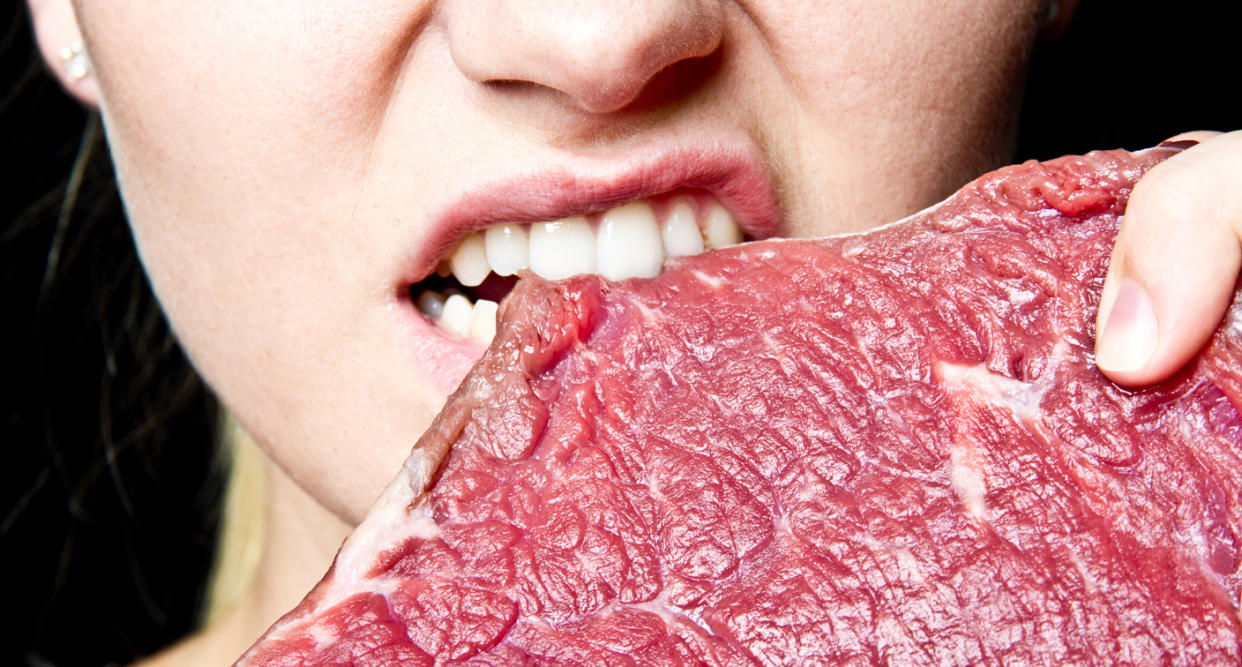Woman claims eating all-meat diet helped her lose weight post-pregnancy — here’s why that’s not healthy

A pregnant mom of two says that eating an all-meat diet — also known as the Carnivore Diet — helped her lose weight post-birth and cleared up her acne.
The 26-year-old mom, Sara Zielke, told the Daily Mail that she struggled to lose weight after having her first two children. She heard about the meat-only diet and decided to try it back in October 2018, sticking to eating only meat, including organ meats such as liver, along with some eggs and dairy. Zielke says that, before becoming pregnant with her third child (she is 17 weeks along), she had lost 30 pounds and her complexion cleared up.
“The benefits that I personally have experienced is a satiated appetite, amazing body composition, cleared up and brighter skin, calmer mood, greatly improved energy levels and absolutely no pain in my body,” the Wisconsin native told the publication.
But is it healthy?
Not really. Stacey Pence, registered dietitian at The Ohio State University Wexner Medical Center, tells Yahoo Lifestyle that restrictive diets like these are not healthy. “Food elimination diets or very restrictive diets generally are not recommended for overall health unless you have food allergies, intolerances or a specific medical condition where it might be recommended to avoid or eliminate certain foods,” Pence says.
She continues: “If limiting your diet to only meat, you will be missing out on a variety of other nutrients, including phytochemicals from our plant-based food sources that may improve immune system and reduce inflammation, to name a few benefits. There are many other individual nutrients that an all-meat diet would be lacking.”
According to the 2015-2020 Dietary Guidelines for Americans, research shows that a diet rich in plant-based foods (fruits, vegetables, beans, legumes, nuts, seeds, whole grains) can reduce your risk of developing chronic disease. For a cancer-protective diet, the American Institute for Cancer Research recommends limiting your animal proteins to one-third or less of your plate and filling two-thirds or more of your plate with fruits, vegetables, beans and/or whole grains.
Pence also points out that pregnancy is not the time to be so restrictive with your diet. “Nutrients are our babies’ building blocks, and this is not a time I would recommend following an elimination diet or very restrictive diet,” she says. “This is an even more critical time to get the nutrients in from a variety of sources for fetal development.?”
The weight loss explained
However, it’s not exactly surprising that, before becoming pregnant, Zielke would lose weight on a mostly meat diet. Even if one’s eating style isn’t considered balanced and healthy, it’s still possible to lose weight. “Weight loss is just a matter of energy — a.k.a. calorie — deficit,” explains Pence. “If you do any food group elimination or portion reduction, you will be reducing calories, which leads to weight loss. A reduction of any macronutrient — carbs, protein, fat — can lead to calorie deficits, causing weight loss.”
And on restrictive diets, carbohydrates are usually the first ones to go. “Unfortunately, carbohydrates are often given a bad rap,” says Pence, who explains that it’s preferable to get carbs from low-fat dairy, fruits, vegetables, whole grains and beans. “Carbohydrates are just one of the three macronutrients that provide calories in our diet. If you consume a carbohydrate-heavy diet, which leaves you feeling less satiated, it can cause weight gain, but any macronutrient (carbs, protein, fat) in excess can cause weight gain.”
Pence notes that while “many people often exceed the recommended portion of carbohydrates, which can lead to weight gain,” she adds that “carbs are not the enemy — often our portion sizes are!”
Can an all-meat diet clear up acne?
The mom also claims that the all-meat diet cleared up her acne. But dermatologist Nava Greenfield of Schweiger Dermatology Group in Brooklyn, N.Y., tells Yahoo Lifestyle that’s unlikely. “An all-meat diet is very difficult,” she says, “and there is little to no evidence that it will clear up acne.”
However, Pence notes that there are animal sources high in vitamin A, such as beef liver and cod liver oil, which may help improve skin. “The vitamin A in these food sources are a pre-formed vitamin A known as retinol, which may improve skin health,” she says. “Retinol is often found in skin care products.”
In general, though, Greenfield says, “Eating a healthy, well-balanced diet will optimize the appearance of your skin, while excessive alcohol, diets high in the glycemic index and avoiding entire food groups can leave your skin looking dull and unhealthy. Your skin needs nutrients and vitamins to function properly and those are mostly obtained through diet.”
Greenfield says that a daily multivitamin can be beneficial if you aren’t eating well-balanced meals, but the best diet for maintaining good skin is to “drink plenty of water, eat healthy and diverse foods and avoid too many processed foods with chemical ingredients. Fresh fruits and vegetables should be plentiful and alcohol intake should be moderate.”
Read more from Yahoo Lifestyle:
Follow us on Instagram, Facebook and Twitter for nonstop inspiration delivered fresh to your feed, every day.

